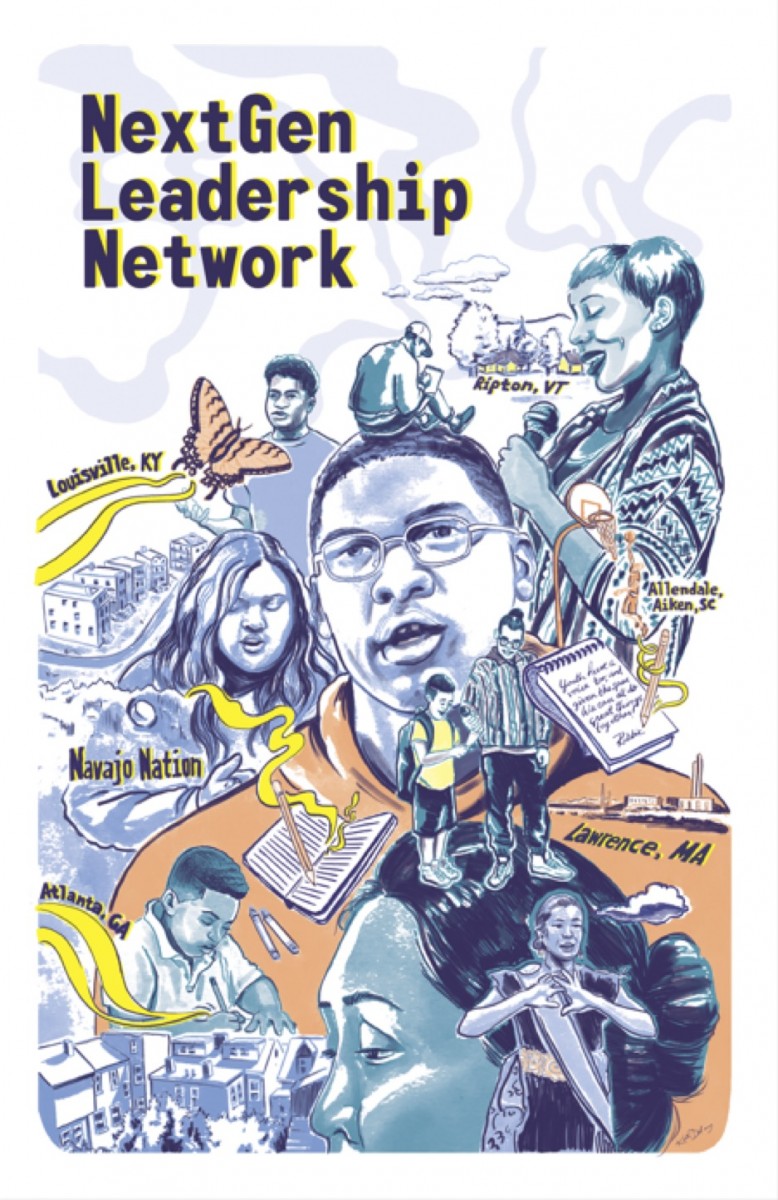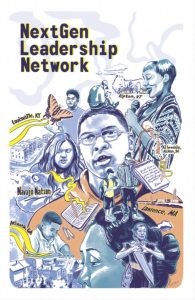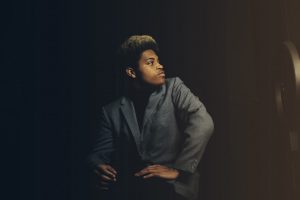BLTN NextGen: A Youth Social Action Movement
0February 11, 2019 by Dixie Goswami

The Next Generation Leadership Network (BLTN NextGen) is a collaboration between Middlebury College’s Bread Loaf School of English (BLSE) and Ivan Allen College at the Georgia Institute of Technology. Working with underserved youth in six sites across the United States, the network is currently funded by the Ford Foundation. The network seriously engages the question: What does it mean to offer robust leadership and learning experiences to youth (ages 15-21) from youth as they prepare themselves for social action in our complex world? We must ask, then: How can we help these youth prepare themselves to be positive factors in their communities and their arenas of work? How can we provide a framework for generating images, stories, social media connectivity, and data that have the potential to change the national narrative about the capabilities and passionate resolve of these youth?
In response to these vital questions, BLTN NextGen brings together youth-centered social action teams with grass-roots initiatives developed by these teams that are locally grounded in six geographical locations across the United States: Lawrence, Massachusetts; Atlanta, Georgia; rural South Carolina; the Navajo Nation; Louisville, Lexington, and Appalachian Kentucky; and rural Vermont. BLTN NextGen is designed to invest in the talents and prospects of youth, with direct attention to youth from underserved areas. It aims to corral the potential already in evidence in the established action teams, to help the youth enhance, refine, and amplify the strengths they are garnering locally by connecting them with each other, and to affirm and support their potential for leadership, action, and advocacy.
The central activity of BLTN NextGen is the organization and networking of youth-centered think tanks within which youth from underserved communities can grow and flourish as leaders and advocates: not in the future but in the present, with their stories and mapped pathways delivering a theory of action and a set of beliefs that will serve as a bulwark against the inequitable privatization of public education. Youth are essential and powerful allies in producing equitable change from the outside of institutional structures: that is, from social action networks and grass-roots social action communities as well as social action, community-centered professional education and learning opportunities.
Video and images below capture moments and perspective from summer and fall 2018 NextGen activities. Youth are now busily preparing for the March 21-24 Hazhó’ó Hólne’ Writing Conference in Window Rock Arizona, with the theme “Revitalization: Holistic Healing through Growth.”
Video produced by Ed Dooley of Mad River Media. For more BLTN NextGen video, visit http://breadloafnextgen.middcreate.net/videos/
Below are from the images Summer 2018 NextGen Conference at the Middlebury Bread Loaf School of English campus in Ripton, Vermont (courtesy of Teddy Anderson, Middlebury College) followed by year one reflections by Robbie Spencer, BLTN NextGen’s Coordinator of Participatory Action Research, and a set of images from the November 3, 2018 Andover Bread Loaf conference and NextGen convening , “My Identity: Reclaiming Ourselves through Writing & the Arts.”
Robbie Spencer is BLTN NextGen’s Coordinator of Participatory Action Research. He represents BLTN NextGen Louisville, as well as the network at large. Robbie gave this talk to kick off the NextGen gathering in Lawrence, November 3, 2018.
Reasons for Being: A Reflection on the NextGen Leadership Network by Robbie Spencer
BLTN NextGen: Becoming a Network
Imagine traveling upstate to Vermont by car for the first time. A ten hour drive, your headphones are in, and you’re listening to the music that makes you think. The drive that felt strange and forever perplexing. The greens and browns of earth and her plants are more vivid than you imagined. Imagine seeing the reality in a new light and realizing that the world is bigger than you know. From this moment forward, the change begins.We arrived in Vermont mutually confused. I was in a room full of strangers, but I knew these weren’t ordinary youth, given that our local mentors brought us here. Everyone here had a sense awareness. What was once all walks of Kentucky, was now all walks of America. Over the next couple of days, we grew closer. We learned about each other’s struggles, discovered our strengths, and identified our weaknesses when it came to being leaders and agents of social action. One would think that this would just be a summer program or camp where we met people, did activities, bonded, and went home. It was much more than that. We came here with a goal much bigger than occupying our time in the summer. Every youth present at the conference, that would later be identified to us as the founding of BLTN NextGen, was there because they believed in youth leadership. This was not a new movement, but a renewed one—a movement made stronger because we, the future generation and leaders of America, of the Navajo Nation, of the Dominican Republic, of Andover and Lawrence, of Black Lives Matter, of the LGBT community, of our children and their children, were now in one room.
We all fell in love—with our work, our neighboring communities, with each other and with ourselves. We used writing, photography, spoken word, and art to connect with each other. The common denominator in all of our work that weekend was passion. We explored the possibility that our passion and the written word were our most powerful tools in the process of change. Everything we did lead us in the direction of becoming better leaders. Our departure from that unique place in the mountains of Vermont was only a temporary farewell. Since then, we have been connected, working endlessly to push the notion that the future generation is now, not later. We are stepping up to make the decisions that those who have been above us refuse to make.
NextGen Year Two
Within just a year of that conference, we grew. More and more youth began joining their local action teams, thus joining the network of sites that make us. In less than one year, I have traveled to all five other states, connected with the youth, and learned from cultures I wouldn’t see in my old Kentucky home. I’ve set foot on Navajo soil and heard the stories of the land from its children. I’ve partied with the locals in Lawrence, Massachusetts and learned from their battles to hold the fate of their education in their own hands. I’ve celebrated with Atlanta and their black community, and documented it all. I have been so many places and have learned so much about myself—things no one could teach me deliberately. My voice is as strong as my lungs, my presence is as powerful as my stature, and my name is heavier than my heart, all thanks to the experiences found through NextGen.No one’s journey with NextGen is the same. Some of us find roads to new lives. Some of us find people with hearts that beat with an unforgettable kindness. Some of us see NexGen as the fruits of our labor; 30 years of educator networking and writing, and finally, we are together. If you ask one of us, “What is NextGen?,” you will never get the same answer. Some of us may still not know the ‘textbook’ description of who we are, but there is an unspoken understanding. Upon that understanding, we build our own individual stories.
What’s the Story? Louisville: Local Roots for National Action
My story really begins with Andrew Fryberg, Tyrone Lawson, Victoria Leigh Solo, and Larry Wallington. It begins with Martin Aguiano, Luke Hoyer and Peter Wang, whose journeys were ended before the age of 16. They were students like me. They were searching for a purpose and a reason to make a difference in the world, until the day they became someone else’s reason. It has always been so much easier to put words into visuals when it comes to reflecting on the life changing experiences of the Next Generation Leadership Network and I call up their images as I reflect on how I became involved with NextGen.I think, too, about Joaquin Oliver, Alaina Petty, Cara Loughran, Jamie Gutteberg, Nicholas Dwoart, Alyssa Alhadeff, Maurice Stallard and Vicki Lee Jones, our Parkland peers who were our future and had futures of their own.
In my early years of high school, I was invited to a local social action team that encouraged youth to take on social issues—issues that took the lives of Sandra Bland, India Kaeger and Gynnya McMillen. Within this small local group of students, I found a family that was closer than family—a family that loved, like Luke Hoyer’s. I remember these names, because they became my reason.
A group of kids, we were from all walks of Louisville, Kentucky, like Maurice Stallard and Vicki Lee Jones who were gunned down in our city. Our collective gave us colors to feel, sounds to vibrate our skin, feelings and tastes of being human. This experience was my gateway to the one here at BLTN NextGen, an experience fueled by my knowledge of the vulnerability of our young lives in our city. Our group was a blend of cultures, races, sexual orientations, gender identities, economic standings and personal experiences. We gave ourselves or should I say, borrowed, the title of “What’s The Story? Louisville?” What is our story? It was a pressing question for me because while I could tell my story, Eugene Sergo could not, Alicia White could not—Trayvon Martin’s was, and can only be, told for him. Despite this opportunity, felt challenged to find my voice and felt at times like I was only moving pebbles. Looking back now, I have come to see that an underlying challenge, as with most local social action teams, was that everyone here lived in the same location. Our geographical experiences, demographics, and ideas were similar enough that it was hard to feel the resonance of our voices.
My frame of reference changed as I began to see our work in a national context. Events like the one that claimed the lives of 11 citizens in the city of Pittsburgh three days before I was to present this reflection as a talk at the Lawrence NextGen gathering pressed on me. Hate crimes that tell us black and brown skin does not matter, that tell us trans identities do not exist, that tell us love is exclusively between man and woman, that tell us “guns don’t kill people, people kill people,” add urgency to our local work. They give me resilience, and a compelling reason for being, and acting.
I remember these names of those who passed, because they are my reason. Not because they are gone or because they are victims, but because they lived and they were here.
If NextGen has taught me anything about myself, it is that we all hold leadership potential when we find our reason for being. We remember that we have a duty to fight for what is right. I remember times when I have felt like giving up. Everything in this world felt hopeless and cruel; happiness turned to ashes in my mouth and childhood slipped from one hand while reality gripped the other. I wanted to give up because the world and her grief became too heavy to hold alone. But then I came here, and realized I wasn’t holding it alone. I had people who cared by my side—people who impact me every day more than they will ever know. Thank you Tom, thank you Ceci, Rex, Gladdys, James, Amaryllis, Dewight, Akwelle, NaZae, Beverly. And last but certainly not least, thank you Dixie. I was being crushed under the weight of my own worries, and you all saved me. Now, we can save others too. We youth are not alone, we are together, and together we WILL change the world.
Photos from “My Identity: Reclaiming Ourselves through Writing & the Arts,” an Andover Bread Loaf workshop attended by members of five of the six BLTN NextGen sites held November 3, 2018 at the Girls & Boys Club of Lawrence. Susan Miera’s report on the NextGen activities during the Lawrence conference may be accessed here.
Category BLTN NextGen, BLTN Teachers, Featured, Winter 2019 | Tags:


Leave a Reply